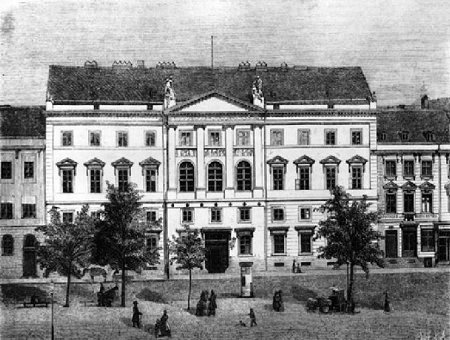|
Robert Von Keudell
Robert von Keudell (27 February 1824 - April 25/26 1903) was a German diplomat, politician and music lover. Life Von Keudell's parents were the Prussian major Leopold von Keudell (1769-1831) and his wife Wilhelmine von Hartmann (1789-1848). He was born in Königsberg. Keudell studied law at the Albertina University in Königsberg. Keudell was an excellent pianist and admirer of Robert Schumann, with whom he corresponded from 1847 to 1853. His two wives were also talented pianists. His second wife played with Joseph Joachim Joseph Joachim (28 June 1831 – 15 August 1907) was a Hungarian violinist, conductor, composer and teacher who made an international career, based in Hanover and Berlin. A close collaborator of Johannes Brahms, he is widely regarded as one of t ... and Anton Rubinstein, among others. In 1839-1840 he had become acquainted with Fanny Mendelssohn, Fanny Hensel in Italy and had encouraged her composition. From 1872 to 1873 he was German envoy at the Sublime P ... [...More Info...] [...Related Items...] OR: [Wikipedia] [Google] [Baidu] |
Bundesarchiv Bild 183-R09517, Deutsch-französischer Krieg, Hauptquartier Versailles
The German Federal Archives or Bundesarchiv (BArch) (german: Bundesarchiv) are the National Archives of Germany. They were established at the current location in Koblenz in 1952. They are subordinated to the Federal Commissioner for Culture and the Media ( Claudia Roth since 2021) under the German Chancellery, and before 1998, to the Federal Ministry of the Interior. On 6 December 2008, the Archives donated 100,000 photos to the public, by making them accessible via Wikimedia Commons. History The federal archive for institutions and authorities in Germany, the first precursor to the present-day Federal Archives, was established in Potsdam, Brandenburg in 1919, a later date than in other European countries. This national archive documented German government dating from the founding of the North German Confederation in 1867. It also included material from the older German Confederation and the Imperial Chamber Court. The oldest documents in this collection dated back to the year ... [...More Info...] [...Related Items...] OR: [Wikipedia] [Google] [Baidu] |
Prussian House Of Representatives
The Prussian House of Representatives (german: Preußisches Abgeordnetenhaus) was the lower chamber of the Landtag of Prussia (german: Preußischer Landtag), the parliament of Prussia from 1850 to 1918. Together with the upper house, the House of Lords (german: Preußisches Herrenhaus), it formed the Prussian bicameral legislature. The Prussian House of Representatives was established by the Prussian constitution of 5 December 1848, with members elected according to the three-class franchise. At first it was called simply the "Second Chamber," with the name "House of Representatives" (') introduced in 1855. Franchise From 1849, the election of representatives within the Kingdom of Prussia was performed according to the three-class franchise system. The election was indirect. In the primary election, those with the right to vote went to the ballot and, in three separate classes, chose electors, who, in turn, chose the representatives for their constituency. Several attempts to ... [...More Info...] [...Related Items...] OR: [Wikipedia] [Google] [Baidu] |
19th-century German Diplomats
The 19th (nineteenth) century began on 1 January 1801 ( MDCCCI), and ended on 31 December 1900 ( MCM). The 19th century was the ninth century of the 2nd millennium. The 19th century was characterized by vast social upheaval. Slavery was abolished in much of Europe and the Americas. The First Industrial Revolution, though it began in the late 18th century, expanding beyond its British homeland for the first time during this century, particularly remaking the economies and societies of the Low Countries, the Rhineland, Northern Italy, and the Northeastern United States. A few decades later, the Second Industrial Revolution led to ever more massive urbanization and much higher levels of productivity, profit, and prosperity, a pattern that continued into the 20th century. The Islamic gunpowder empires fell into decline and European imperialism brought much of South Asia, Southeast Asia, and almost all of Africa under colonial rule. It was also marked by the collapse of the la ... [...More Info...] [...Related Items...] OR: [Wikipedia] [Google] [Baidu] |


